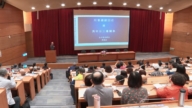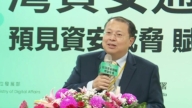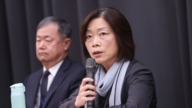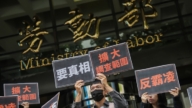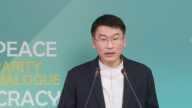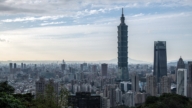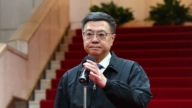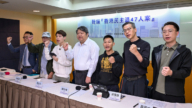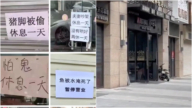【新唐人2016年07月22日訊】7月22日,中華民國總統府發佈總統蔡英文,接受華盛頓郵報資深副主編魏茂斯(Lally Weymouth)專訪的全部問答內容,話題涉及九二共識、兩岸關係、南海主權糾紛等諸多敏感議題。訪談全文如下(英文在下面):
蔡英文總統接受華郵專訪全文(中文):
問:您對習近平的印象如何?
總統:就像我在CSIS講過的,對於習近平主席能夠勇敢地採取措施進行反貪腐的這件事情,我覺得在中國大陸發展的進程上,這是很重要的一件事情,我也非常期待他在處理兩岸關係上面,能夠有更大的彈性,也能夠充分認知台灣是一個民主的社會。總統也好,或者政治領導人的決定,是必須要依循民意,所以我也希望他能夠體認到台灣是一個民主社會,民意的走向其實是非常重要的。
問:有些學者說,習近平設定了要您同意92共識之期限,這個正確嗎?
總統:兩岸的問題很多人都很關注,很多人都有他們自己的觀察,不過我相信,習近平主席做為一個國家的領導人,他應該有能力能夠綜合所有的情勢,來做一個很好的決定,做一個正確的決定。尤其是台灣已經是一個非常民主的地方,民意的走向其實非常重要,所以設定期限,要求台灣政府違反民意去承受一些對方的條件,其實可能性是不大的,我也相信他們應該會有這樣的認知。
問:自您5月下旬就職以來,陸方已經切斷台灣與中國大陸之間正式溝通管道,您打算如何處理日常與北京間的關係?
總統:我們雙方之間溝通的管道其實是很多元的,尤其是在這幾十年來的發展,雙方的交流其實非常多元而且頻繁,在交往的過程中,其實也產生很多互相溝通的模式,這些溝通不只是在官方的層次,還包括每一個不同層級,還有民間的溝通,都在整個兩岸之間溝通的這種結構裡面。我們雙方之間立場上的差異,其實在我520的就職演講裡面,我也盡了最大的力量,來讓雙方的立場可以縮小差距,我也相信在某種程度,中國大陸方面也會認知到520講話裡面的善意。
問:但看來似並非如此。中國大陸國務院台灣辦公室表示,您的就職演說是「一個未完成的答卷」,迄今並無公開的跡象顯示他們肯定您的立場。而您身為總統,是否和中國大陸政府的對口有接觸?
總統:就像我講的,現在所暫停的是兩會的管道、陸委會與國台辦的管道,這在官方的意義或許是存在的,但問題是長久以來,雙方之間管道確實是很多元的,現在看到的兩會,也就是海基會與海協會兩會的溝通體制,只是整個多元管道中間的一部分。當我講到多元,其實它是有多層次的面向,不僅是政府在交流的過程中,很多政府機關跟他們在中國大陸的對口,也都有一定程度相互通訊息與交換意見的機制。I’m saying different levels of the government have different ways of communicating with their counterparts in China.(我政府各層級都有和中國大陸對口機構聯繫的管道)我不能在這個階段進入太多細節。
問:您認為您有在縮小台灣與中華人民共和國之間的隔閡嗎?
總統:這段時間以來,我們都非常謹慎處理與中國大陸的關係,我們除了不採取挑釁的態度,防止意外的發生之外,也希望透過資訊的交流,能夠建立起雙方的互信。
問:您代表許多較偏向認同「台灣人」,而不是「中國人」的台灣年輕一代,他們比老一輩更支持獨立。身為總統,您要如何維持兩岸關係的穩定,但同時也要讓年輕的選民滿意,您如何取得平衡?
總統:It is a fact that different generations, and different people of different ethnic origins, they have different views on China. But they all agree on one thing: that is democracy.(事實上不同世代和不同族群的民眾對中國大陸會有不同的看法。但是,有一件事情,他們的意見一致,那就是民主。)
問:美國自1979年之後改承認「中華人民共和國」(首都在北京)代表「中國」,而將中華民國的台灣(首都在台北)視為一個「實體」(entity),您覺得這是公平的嗎?
總統:我想我不太清楚美國在講這個字- “entity”的時候,它的意思是什麼,但是這個 “entity"有很多可以詮釋的空間。以台灣來講,我們有一個完整的政府跟民主的機制,我們有軍隊,我們是一個可以為自己做決定的國家。所以,或許美國或者其他國家有不同的想法或是不同的角度,但從我們來看,其實絕大多數的台灣人覺得我們確實是一個國家。
問:沒有被國際社會承認,您是否覺得不公平?
總統:It is indeed unfair。(這確實是不太公平)
問:美國讀者與我都難以理解,身為台灣總統,您只被允許在美過境停留48小時。
總統:It is indeed. (的確如此。)
問:有報導指出,來自中國大陸的觀光客減少了,這會傷害台灣的觀光產業嗎?
總統:我們是看到有一些在量上面的減少,但是整體而言,對我們觀光產業有多大的衝擊,我們還在評估當中。不過整體來說,我們也希望我們觀光客的來源是多元的。所以,我們也會持續強化對於其他來源觀光客的爭取,而且我們的觀光產業可以發展出適應不同來源的觀光客,能夠更多元,而且更能夠適應不同的觀光客。
問:中國大陸如果執意的話,可能會對台灣施加更多壓力,他們會威脅破壞你們與邦交國的關係並嚇跑他們,您會擔心這個嗎?
總統:關於經濟的手段,我不是指他們(中國大陸)現在正在做,但如果他們用經濟手段加壓力的話,其實中國大陸也應該想像他們要付出的代價,就是今天中國大陸可以這樣對台灣的話,它也可以對其他周邊的國家。所以,我相信很多周邊的國家都會很仔細地觀察中國大陸會不會對台灣以經濟的手段來加壓,中國大陸如果要成為一個在這個區域是受尊敬的國家,我相信他們會小心地考慮這件事。
問:所以您認為台灣與邦交國的關係會繼續維持嗎?
總統:我們會盡力維持我們的邦交國,也希望跟我們邦交國發展出一種互惠的關係,也就是在經濟發展、社會發展、文化及教育上的交流都能持續強化,讓他們真心感受到與中華民國維持邦交是一件有意義且有助益的事情。
問:您的前任馬總統曾計劃向美國購買66架F16戰機,儘管有47位美國參議員致函支持,但最後都沒有結果,您會繼續提出此項請求嗎?
總統:我們會持續評估國防的需求,持續向美國提出軍事合作計劃,所以這些方面我們會持續與美方來進行溝通,同時也會對防衛需求做更準確的評估。在這個階段,我們的需求主要還是在水面艦、潛艇、防空系統及網路安全,這些方面我們有比較強的需求。
問:馬前總統之前也希望向美國購買柴電潛艦,但未竟其功,您會再重覆此訴求嗎?
總統:In three areas our needs are more urgent, there are surface ships and submarines, air-defense and cyber-security areas. In submarines, we are trying to develop our own, to develop indigenous capabilities.(在三個領域,我們的需求較急迫,如水面艦和潛水艇、空防和網路安全領域。在潛水艇方面,我們正嘗試著開發自己的潛艇,發展本國的能力。)
問:美國總統候選人希拉里(Hillary Clinton)與川普(Donald Trump),哪一位當選對台灣比較好?
總統:作為一個其他國家政府的領導人,我們不方便對美國總統選舉做過多的評論。不過我們也希望,無論哪一位當選美國總統,我們都能夠持續現在的關係,而且在現在的關係上,發展下一階段更緊密且互惠的關係。
問:您施政的焦點是內政,像是提高薪資以及增加休假的時間,但是目前台灣經濟成長率低於1%,您如何在增強經濟發展的同時,亦增加社會福利呢?
總統:我想這些事情,不是一個藥方可以解決所有問題,其實台灣的經濟需要做結構性的調整。也就是我們新的經濟發展模式是走向以創新研發來讓我國的產業可以進到下一個階段、下一個時代。這跟以往我們以製造、效率,也就是成本驅動的成長模式是不一樣。因此我國在下一個世代的經濟產業規劃上非常強調創新與研發,而台灣剛好是一個適合創新與研發的地方,因為我們有很多好的產業基礎,也有很多好的研發人才。因此只要我國在這裡著力夠深,我們會用幾個主要的產業來帶動整個台灣產業的轉型,而這幾個主要的產業包括生技、綠能、智慧機械、IOT的產業及國防產業。
問:中國大陸不是你們第一大貿易夥伴嗎?
總統:到現在為止還是,但問題是因為兩方的經濟互補性已經開始在降低、而競爭性已經在加強,所以我們對於雙方的經濟與貿易關係必須做一個重新檢討,務必要使雙方的經貿關係是一個相輔相成且互利的關係,而不是一個過度競爭的情況。 The two economies in the past had a high degree of complementarity, and since we had the ability to organize a manufacturing process, and then we move our manufacturing to the ability to China to make best use of their labor. And now the situation is very different. I mean, the labor cost is increasing and China has their own capability.(過去兩岸經濟有高度的互補性,而我們擁有製造業能力,並轉往對岸,善用他們的勞力。而今非昔比,對岸勞力成本增加,且已具備製造能力了。)
問:所以中國大陸變成台灣的競爭對手?
總統:They are more and more our competitors.(他們越來越是我們的競爭對手了。)
問:我看到您對海牙常設仲裁庭有關南海仲裁結果表示失望,該仲裁將台灣聲索的太平島認定為「礁」,而非「島嶼」,因此不能享有200浬專屬經濟海域,您會遵守仲裁庭的判斷嗎?
總統:我們已經公開聲明,這個仲裁的決定有損於台灣的利益,所以我們不能夠接受,我們也認為這個裁判對台灣沒有法律約束力。主要有幾個原因,第一個是因為我們是一個重要的利益相關方,但是我們沒有被邀請參與整個仲裁的程序。第二,我們對於被稱為「The Taiwan Authority of China」不能接受。第三,在這個地區,我們擁有主權的太平島,在裁決中被認為是一個「礁」而不是「島」,這是違反我們長期以來的主張,我們也認為它確實是一個島。在這裡我想利用這個機會,把台灣政府對南海爭端的立場做一個說明。第一,當然是有關南海爭端應該依據國際法與海洋法,包括《聯合國海洋法公約》,用和平的方式來解決。第二,我們主張台灣應該要納入多邊爭端解決的機制。第三,在這個地區的相關國家有義務維護南海的航行與飛越自由。第四,中華民國主張以「擱置爭議、共同開發」的方式處理南海爭議。我們期待相關國家能秉持相同方式進行協商,來和平解決這個爭端。
問:您是亞洲地區首位並非出自於政治世家的女性總統,您如何做到的?
總統:我覺得我的出現其實跟台灣的民主發展很有關係,也就是說,台灣民主發展的過程是一個漸進、由下而上的過程。所以台灣的新世代領導人其實都來自民間或是跟基層有比較強的連結的政黨。
問:在男性主導的社會裡,女性要爬升到領導人的地位一定很難。
總統:Yes to a certain extent, but I think the society and our democracy is mature enough to appreciate the value of the individual politicians. They place emphasis on the quality and the value of individual politicians rather than their gender. So of course, some people will find it fashionable to find a woman leader, but I think the reason why people chose me as leader of this country was because of my policy, my values, suit the needs of Taiwan today.(某種程度上是,但我認為我們的社會和民主已夠成熟,能欣賞個別政治人物的價值。他們重視個別政治人物的品質和價值勝過性別。所以,當然,某些人會覺得找個女性領導人很時尚,但我覺得人民選我當這個國家的領導人,是因為我的政策、我的價值符合現今的台灣需要。)
Meaning that we represent people who want to have change in this society, after years and decades this place has been dominated by a single party, with the exception of 2000-2008, but over the last few decades, all dominated by the KMT. The whole social structure and values were shaped by this regime, KMT government, over the years. But people now realize that we’re in a different situation now, we want to move forward, we have to restructure ourselves, and redefine the current values. So they want the place to be more democratic. They want this place to place more emphasis on human rights and transparency, in terms of government decision-making and public participation in the government’s decision-making process. And essentially people want to participate, they want to have a voice in the major decisions of the government. So this is somehow different from the way the government conducted business since the days when this place was an authoritarian place.(我們代表社會上渴望改變的人民。這片土地除了2000年到2008年以外,數十年來均被單一政黨,即國民黨所主導,整個社會結構及價值都由這個政權形塑而成。如今人民了解我們的環境已經不同,我們想要向前行,我們想要進行重整,重行定義目前的價值。人民想要更為民主的環境,在政府決策過程中,民眾能參與官方決策,並更重視人權及透明度。本質上來說,人民想要在政府重大決策中,能參與其中並發聲。這與過去這片土地是威權統治、由政府主導的情境,有些許不同。)
問:國民黨長期進行軍事統治?
總統:So the expectation of the people is very different. They want democracy, they want public participation, they want transparency, they want to have fair elections, they want to have sound judicial system, not too much interfered by politics. They want to have an effective judicial system to settle whatever disputes that people may have in their daily lives so they want to have a good social safety net to protect them in case they fell in a very competitive society. (現在人民的期待有很大的不同,他們想要民主、民眾參與的機會與透明度,以及公平的選舉;他們想要有完善的司法體制,不要有太多的政治干預;他們想要有效的司法體制,以處理日常生活遇到的爭議,擁有妥善的安全網來保障他們,以防在競爭劇烈的社會中陷入困頓。)
英文全文:
(華郵報導,請看:https://www.washingtonpost.com/opinions/2016/07/21/44b0a1a4-4e25-11e6-a422-83ab49ed5e6a_story.html)
Q: What is your impression of Chinese President Xi Jinping?
A: I think that Chairman Xi’s courage tackling corruption is an important matter in the development of Chinese society. I also look forward to him showing a bit more flexibility in dealing with cross-strait relations. I hope that he can appreciate that Taiwan is a democratic society in which the leader has to follow the will of the people.
Q: Some academics say Xi has a certain deadline by which he wants you to agree to the ’92 consensus. Is that right?
A: It isn’t likely that the government of Taiwan will accept a deadline for conditions that are against the will of the people.
Q: Since your inauguration in late May, the Chinese have cut off the official channel that was used to communicate between Taiwan and the mainland. How do you plan to handle day-to-day relations with Beijing?
A: We have always had diverse channels of communication across the strait. These include not just official communications but also people-to-people contacts. . . . There are differences between the positions of the two sides of the strait. In Taiwan, we have done our best to minimize that gap. I believe that the Chinese realize the goodwill we have put forth at the inauguration.
Q: It doesn’t seem that way. I think it was China’s Taiwan Affairs Office, part of the State Council, which said that your speech was “an incomplete exam.” There is no public indication that they appreciated your position. Are you, the president, in touch with your counterparts in the Chinese government?
A: Different levels of the government have different ways of communicating with their counterparts in China. At this stage, I cannot go into too much detail.
Q: Do you feel you are closing the gap between Taiwan and the People’s Republic of China?
A: Over this past period we have handled relations with China very carefully. We do not take provocative measures, we make sure that there are no surprises, and we hope that through channels of communication, we can gradually build up trust.
Q: You represent many of the youth who think of themselves as being Taiwanese, not Chinese. They are more pro-independence than the older generation. As president, you want to maintain cross-strait relations for stability, but at the same time, you must keep your followers happy. How do you balance these factors?
A: Different generations and people of different ethnic origins have different views on China. But they all agree on one thing. That is democracy.
Q: Is it fair that Washington has considered Taiwan an entity, not a country, since 1979, when the United States changed sides and recognized the People’s Republic of China (with its capital in Beijing) — in lieu of the Republic of China in Taiwan (with its capital in Taipei) — as China?
A: I am not clear what the U.S. means when they use the term “entity.” For us here in Taiwan, we believe that we are a country, a democratic country.
Q: So isn’t it unfair that Taiwan is not recognized in the world?
A: It is indeed unfair.
Q: American readers would find it hard to understand that you, as a Taiwanese president, are only allowed to come to the United States for 48 hours, and then only if it is a transit stop.
A: Indeed.
Q: There has reportedly been a drop-off in tourists from the mainland. Will that hurt your tourist industry?
A: We hope to have a more diverse source of tourists.
Q: China could bring more pressure on Taiwan if it chose to. They could frighten away your diplomatic allies by threatening to weaken your bonds with them. Are you worried about that?
A: If they do take economic measures to apply pressure to Taiwan, they will have to think about the price that they are going to pay. Because the surrounding countries will be looking very carefully at what measures China will take against Taiwan.
Q: So you think as far as your alliances go, they will stay as they are today?
A: We will do everything we can do to maintain those relations and make sure that our diplomatic allies feel that having diplomatic relations with Taiwan is worthwhile.
Q: Your predecessor, President Ma Ying-jeou, wanted to buy 66 F-16s from the United States. Even though 47 senators wrote in support of his request, nothing happened. Do you intend to repeat that request?
A: At the current stage what we need are surface ships, submarines and air defense systems, as well as defensive capabilities in terms of cybersecurity.
Q: I think Ma also asked for diesel submarines and got nowhere. Will you repeat that request?
A: We are trying to develop our own [submarines].
Q: When it comes to the U.S. election, Hillary Clinton or Donald Trump — who would be better for Taiwan?
A: As the leader of a different country, it is not very wise for us to comment on the presidential election in the U.S.
Q: I understand that the focus of your program is domestic — that you want to raise wages, to give people more time off. But with a growth rate under 1 percent, how can you spur the economy while delivering increased social services?
A: There is no panacea for this. I think Taiwan’s economy needs an overall structural readjustment. Our new model focuses on innovation and research. This is different from our growth model in the past, which was centered on the manufacturing industry.
Q: Isn’t China your No. 1 trading partner?
A: China is still our largest trading partner; however, complementarity between our economies is decreasing. We had the ability to organize a manufacturing process, and then we moved our manufacturing capability to China to make use of their labor pool. But now the situation is very different. [Chinese] labor costs are increasing, and China has their own capability.
Q: So China has become a competitor of Taiwan?
A: They are more and more our competitors.
Q: I saw that you expressed disappointment over the ruling by the Permanent Court of Arbitration in The Hague on the South China Sea. It held that Taiping Island, which you claim as part of Taiwan, is a rock, not an island, and thus cannot enjoy an exclusive economic zone. Will you abide by the ruling?
A: We will not accept their decision. There are a couple of reasons for that. Taiwan is an important interested party in this case, but we were not invited to participate in the proceedings. Secondly, we found it unacceptable that we were referred to as the Taiwan Authority of China. The third reason is that [Taiping Island really is] an island.
Q: You are the first woman in Asia who does not come from a political family to be elected president of a country. How did you do it?
A: I think that my emergence as a leader is closely related to the development of Taiwan’s democracy. Taiwan’s democracy was a gradual development. It was done from the bottom up. Therefore a lot of the more successful political leaders come from civil society, those that are closer to the grass-roots level of the public.
Q: It must have been difficult to be a woman leader in such a male-dominated society.
A: Yes, to a certain extent. But I think that the society and our democracy are mature enough to place emphasis on the quality and the value of the individual politician, rather than their gender. Some people will find it fashionable to have a woman leader, but I think the reason people chose me as the leader of this country is because my policies and my values suit the needs of Taiwan today. We represent people who want to have change in the society. For years, this place has been dominated politically by a single party, the Kuomintang. People now want the place to be more democratic. They want to place more emphasis on human rights and transparency in terms of government decision-making. This is different from the way the government conducted business in the days when this was pretty much an authoritarian place.
Q: The KMT had a long military rule.
A: The expectation of the people now is very different. They want democracy.
——責任編輯:任浩


